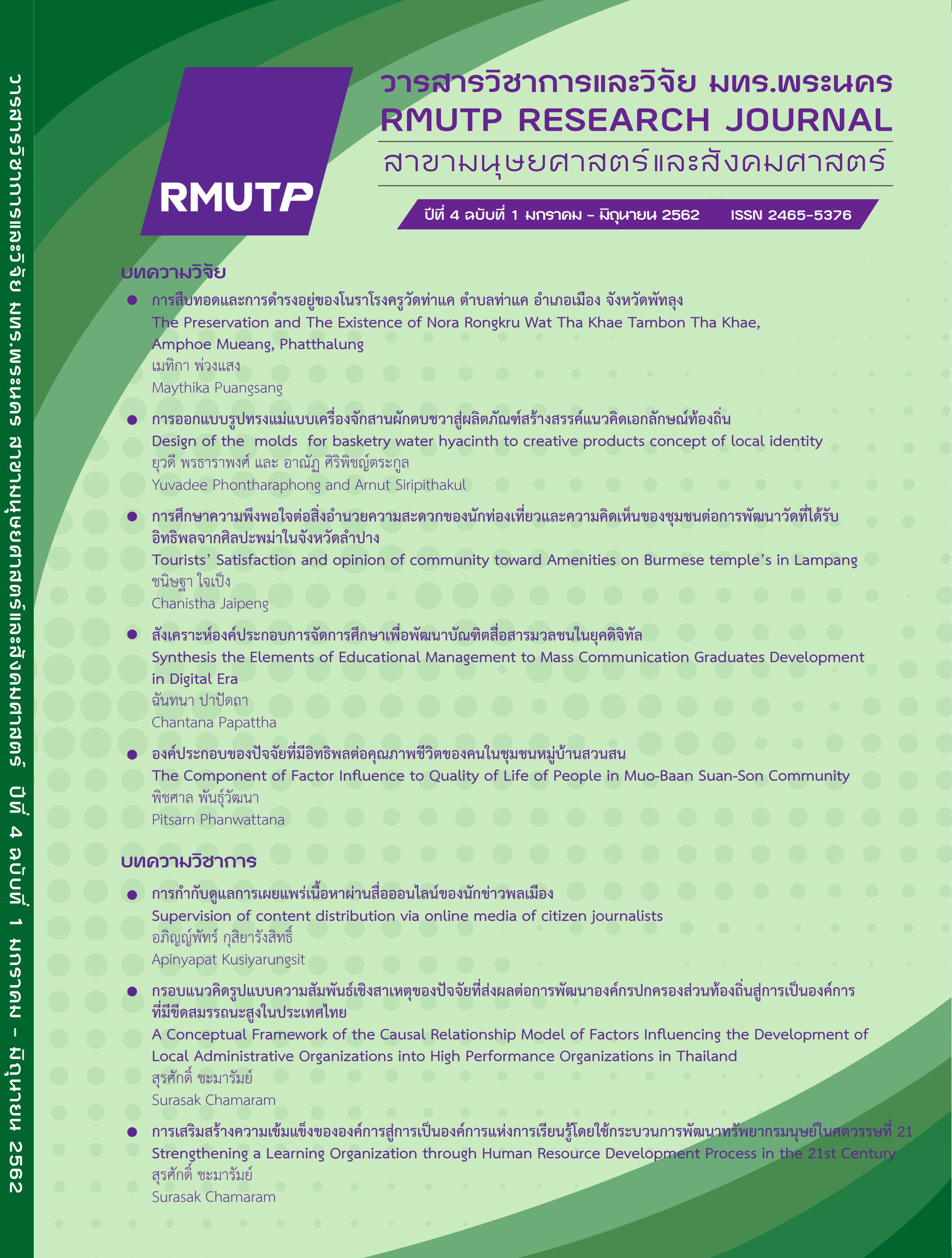Human Resource Development Practices for Human Resource Developer and Enhancing a Learning Organizational Development Human Resource Development Practices for Human Resource Developer and Enhancing a Learning Organizational Development
Main Article Content
Abstract
The organization will be successful in being a learning organization that adjusts to be able to cope with the changing circumstances of rapid change due to globalization depending on Human resource development factor that is an essential activity for human resource developer to enhance Learning organization development. Thus, the objective of this article is to build an understanding of human resource development practices of human resource developer to enhance learning organization development, consisting of 5 activities; training, education, individual development, career development, and organization development. Each process had specific characters and they were related. This is to be ensured that human resource developer in order to develop an organization to effectively improve the success of Learning Organization.
Article Details
References
ประสิทธิภาพมนุษย์. Journal of HRintelligence, 7(2): 41-46.
ชุติกาญจน์ ศรีวิบูลย์. (2557). หลักบริหารพัฒนาทรัพยากรมนุษย์. กรุงเทพฯ: ดร.เพชรสำนักพิมพ์.
ชมสุภัค ครุฑกะ. (2554). ความต้องการพัฒนาทรัพยากรมนุษย์สู่ประชาคมอาเซียน. วารสารวิชาการศิลปะศาสตร์
ประยุกต์. 4(2): 63-70.
โชติชวัล ฟูกิจกาญจน์. (2556). การพัฒนาทรัพยากรมนุษย์: รูปแบบ วิธีการ และแนวทางการนำไปปฏิบัติ. วารสาร
ปัญญาภิวัตน์. 4(2): 104-112.
ฐนันดร์ศักดิ์ บวรนันทกุล. (2557). การเสริมสร้างศักยภาพการพัฒนาทรัพยากรมนุษย์. วารสารวิชาการ
มหาวิทยาลัยปทมุธานี. 6(2): 186-193.
ดวงเดือน จันทร์เจริญ. (2555). นักพัฒนาทรัพยากรมนุษย์กับการคิดอย่างเป็นระบบ. วารสารนักบริหาร. 32(4): 74-
79.
ไตรรัตน์ โภคพลากรณ์. (2559). กระบวนการพัฒนาทรัพยากรมนุษย์. Journal of HRintelligence, 11(1): 6-7.
ไตรรัตน์ โภคพลากรณ์. (2557). ทำไมต้องมีการพัฒนาทรัพยากรมนุษย์. Journal of HRintelligence, 9(2): 9-10.
ไตรรัตน์ โภคพลากรณ์. (2558). ทำไมจึงต้องสนใจคน. Journal of HRintelligence, 10(1): 6.
นิรันดร์ จุลทรัพย์. (2557). การพัฒนาทรัพยากรมนุษย์สู่ประชาคมอาเซียน. วารสารศึกษาศาสตร์ มหาวิทยาลัย
ทักษิณ. 14(1): 38-39.
พยัต วุฒิรงค์. (2559). การพัฒนาความสามารถในการสร้างสรรค์นวัตกรรม ประเด็นท้าทายการพัฒนาองค์กรใน
ทศวรรษหน้า ในการบริหารทรัพยากรมนุษย์ในทศวรรษหน้า หน้า 3-27. กรุงเทพฯ: สำนักพิมพ์แห่ง
จุฬาลงกรณ์มหาวิทยาลัย.
ระวิวรรณ สัมฤทธิ์. (2556). ความต้องการกิจกรรมการพัฒนาบุคลากรตำแหน่งบรรณารักษ์ในห้องสมุด
มหาวิทยาลัยของรัฐ. วิทยานิพนธ์ศิลปศาสตรมหาบัณฑิต สาขาวิชาบรรณารักษศาสตร์และสารสนเทศ
ศาสตร์. คณะมนุษยศาสตร์และสังคมศาสตร์. มหาวิทยาลัยบูรพา.
วิชิต แสงสว่าง และนวัสนันท์ วงศ์ประสิทธิ์. (2558). รูปแบบการพัฒนาทรัพยากรมนุษย์ในการเป็นองค์การแห่งการ
เรียนรู้ เพื่อก้าวสู่ประชาคมอาเซียนของโรงเรียนมัธยมศึกษา จังหวัดฉะเชิงเทรา ประเทศไทย. วารสาร
ศึกษาศาสตร์ มหาวิทยาลัยนเรศวร, 17 (4): 26-39.
วุฒิเทพ อินทปัญญา. (2534). ทิศทางของการพัฒนาทรัพยากรมนุษย์ในอดีต ปัจจุบันและอนาคต. รัฐสภาสาร, 39
(10): 48-63.
วุฒิพล สกลเกียรติ. (2558). นักพัฒนาทรัพยากรมนุษย์ในบทบาทที่ปรึกษาองค์การ. วารสารวิชาการการตลาดและ
การจัดการ มหาวิทยาลัยเทคโนโลยีราชมงคลธัญบุรี, 2 (2): 12-24.
สุธินี ฤกษ์ขำ. (2557). การพัฒนาทรัพยากรมนุษย์: หลักการและการประยุกต์. กรุงเทพฯ: โรงพิมพ์แห่งจุฬาลงกรณ์
มหาวิทยาลัย.
สุนิสา ช่อแก้ว. (2559). ความสามารถในการมีงานทำ ประเด็นท้าทายการบริหารคนในทศวรรษหน้า ในการบริหาร
ทรัพยากรมนุษย์ในทศวรรษหน้า หน้า 29-48. กรุงเทพฯ: สำนักพิมพ์แห่งจุฬาลงกรณ์มหาวิทยาลัย.
สุปัญญาดา สุนทรนนธ์. (2558).ปัจจัยภาวะผู้นำการเปลี่ยนแปลง การพัฒนาทรัพยากรมนุษย์ และความพร้อมสำหรับ
การเปลี่ยนแปลงที่มีอิทธิพลต่อผลการปฏิบัติงานของบุคลากรในมหาวิทยาลัยในกำกับของรัฐ. วารสาร
ปัญญาภิวัฒน์, 7 (2): 28-42.
สุปัญญาดา สุนทรนนธ์. (2559). การพัฒนาองค์การแห่งการเรียนรู้กับบทบาทที่สำคัญของนักพัฒนาทรัพยากรมนุษย์
ยุคใหม่ในการบริหารทรัพยากรมนุษย์ในทศวรรษหน้า หน้า 75-99. กรุงเทพฯ: สำนักพิมพ์แห่ง
จุฬาลงกรณ์มหาวิทยาลัย.
อำนาจ ศรีพูนสุข. (2551). องค์การแห่งการเรียนรู้และการจัดการความรู้ ใน เอกสารการสอนชุดวิชาการพัฒนา
ทรัพยากรมนุษย์ หน่วยที่ 13 หน้า 1-56. นนทบุรี: มหาวิทยาลัยสุโขทัยธรรมาธิราช สาขาวิชาวิทยาการ
จัดการ
Gary N. McLean and Xiaohui Wang. (2007). The Dilemma of Defining International Human Resource
Development. Human Resource Development Review. 6: 96-108.
Marquardt, M and Reynolds. (1994). The Global Learning Organization. BurrRidge, IL:
Irwin Professional Publishing.
McLean, G. N., & McLean, L. (2001). “If we can’t define HRD in one country, how can we define it in
an international context.” Human Resource Development International 4, 3: 313-326.
Nadler, Leonard. (1982). Designing training program: The critical events model. Reading, Mass.
Addison – Wesley.
Nakhchian, Ali Arki, Ahmad Vakili and Bemani, Atefeh. (2013). The Role of Learning Organizations in
Improving Human Resources Management. European Journal of Business and
Management, 5 (13): 159-164.
Ranjbar, Mokhtar and Absalan, Muhammad. (2015). Effect of organizational learning on human
resource development (case study: Payam Noor University in Fars province). Journal of
Scientific Research and Development, 2 (4): 168-172.
Senge, P. M. (1990). The Fifth Discipline: The Art and Practice of the Learning Organization.
New York: Doubleday.
Sherine Fathy El-Fekey. (2015). The Effect of Human Resource Development Practices on Creating
Learning Organizations: An Empirical Study on the Banking Sector in Egypt. Journal of Business and Management Sciences. 3(4): 130-137.
Werner J. M. and DeSimone R. L. (2006). Human Resource Development. 4ed. Delhi India:
Thomson South-western.


